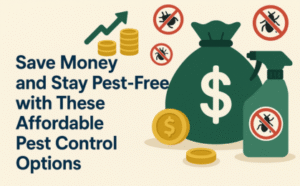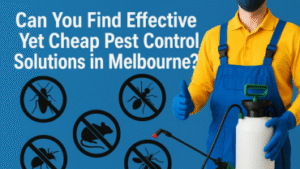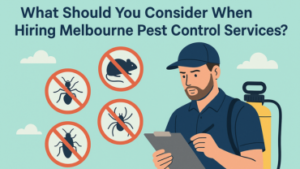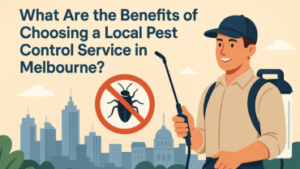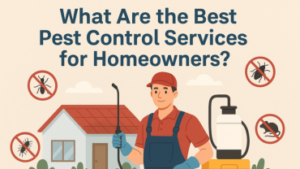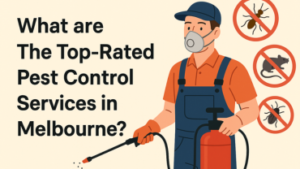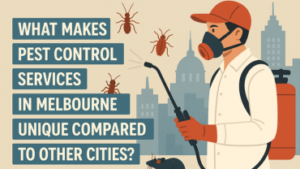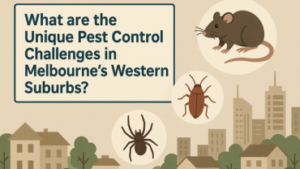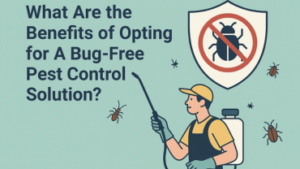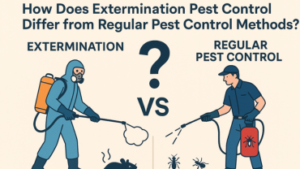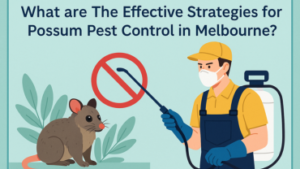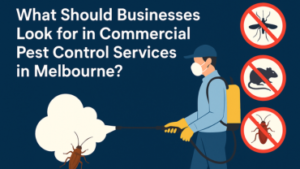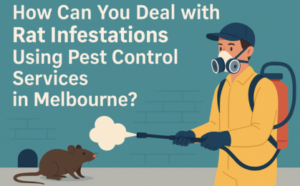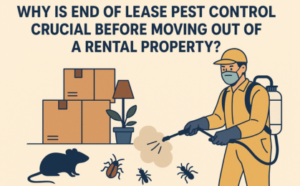Moving out of a rental property can be stressful, packing, cleaning, and ensuring everything is in top condition for the final inspection. But there’s one thing many tenants overlook: end of lease pest control. Skipping this step can cost you your bond and leave you dealing with unnecessary disputes.
In Australia, landlords and property managers expect rental properties to be returned in the same condition as when you moved in, minus normal wear and tear. If pests like cockroaches, rodents, or spiders are found after you leave, you could be held responsible. That’s where professional end of lease pest control comes in.
This blog will explain why end of lease pest control is non-negotiable, how it protects your bond, and why hiring experts like Chris Pest Control ensures a smooth handover.
The Hidden Risks of Skipping End of Lease Pest Control
You’ve scrubbed every corner, patched up nail holes, and even steam-cleaned the carpets. But if pests are discovered after you move out, your bond could be at risk. Property managers conduct thorough inspections, and any sign of infestation can lead to deductions from your deposit.
Pests like cockroaches, rodents, and ants often hide in walls, under appliances, or in dark corners. A quick spray from the supermarket won’t cut it—professional end of lease pest control ensures every nook is treated, leaving no evidence of infestation.
1. End of Lease Pest Control Is Often a Lease Requirement
Check your lease agreement, chances are, there’s a clause requiring end of lease pest control. Landlords want to protect their property and ensure the next tenant moves into a pest-free home. Ignoring this can result in bond deductions or even legal disputes.
Professional treatment provides documented proof that you’ve fulfilled this obligation, giving you peace of mind during the final inspection.
2. Protects Your Bond and Saves You Money
Losing part (or all) of your bond over a preventable pest issue is frustrating. A single cockroach sighting can trigger a full inspection, and if an infestation is found, you may be charged for extermination and deep cleaning.
Investing in end of lease pest control is far cheaper than losing hundreds (or thousands) from your bond. Plus, it ensures a smooth handover, so you get your full deposit back.
3. Prevents Legal Hassles with Landlords
No one wants a nasty email from their landlord demanding compensation for pest-related damages. If pests are found after you leave, you could be held liable, even if the infestation wasn’t your fault.
A professional end of lease pest control service provides a receipt and warranty, proving you’ve taken necessary precautions. This documentation can protect you from unfair claims.
Common Pests Found in Rental Properties
Knowing which pests are most problematic helps tenants understand why treatment is essential.
1. Cockroaches – The Silent Invaders
These pests love warm, moist areas and can multiply quickly. Even if you don’t see them, their eggs might be hiding in cracks. A professional end of lease pest control ensures they’re completely eradicated.
2. Rodents – More Than Just a Nuisance
Rodents chew through wires, insulation, and even furniture. If they’re found after you leave, you could be blamed for the damage. A thorough pest treatment eliminates this risk.
3. Spiders – Unwanted Roommates
No tenant wants to be responsible for a spider infestation. Professional pest control ensures all hiding spots are treated, so the next renter moves into a safe, pest-free home.
Timing Is Everything: When Should You Schedule End of Lease Pest Control?
Most tenants make one crucial mistake by treating pest control as an afterthought. The timing of your pest treatment is just as critical as the service itself. Poor scheduling can lead to several problems:
- Treatments may not be fully effective by inspection day
- Your bond return could face unnecessary delays
- You might incur costly emergency service fees
The Ideal Timeframe: 48-72 Hours Before Inspection
After helping hundreds of tenants navigate this process, we’ve found this timeframe works like magic. Here’s why:
- 1. It gives treatments time to work properly – Those professional-grade sprays need a good 24 hours to dry completely and start doing their job. Any less and they might not be fully effective when the inspector comes through.
- 2. Pests actually disappear – You’d be surprised how many tenants panic when they see more bugs right after treatment. That’s normal! The chemicals need time to take full effect. Within 48 hours, you should see a dramatic difference.
- 3. Your cleaning doesn’t undo the work – If you clean first then do pest control, you might accidentally wipe away those protective barriers. Do it the other way around, and your clean home stays pest-free.
A Movers’ Pro Tip
Here’s a little insider secret from years in the business: coordinate your pest control with your final clean. Book the pest treatment for the day before your professional cleaners come through. This way:
- The pest control has time to work
- Your cleaners won’t disturb the treatment
- You walk into your inspection with confidence
The 3-Step Checklist: How End of Lease Pest Control Saves Your Move-Out
Moving out is stressful enough without worrying about pests sabotaging your bond refund. Follow this foolproof plan to leave your rental pest-free and get every dollar back.
Step 1: The Pre-Treatment Inspection (Where the Pros Look)
Pests are masters of hide-and-seek. Your technician will hunt them down in their favourite hideouts:
- Behind the fridge (where crumbs turn into cockroach buffets)
- Under sinks (leaky pipes = pest water fountains)
- Wardrobe corners (silverfish love your old shoeboxes)
- Garage edges (the rodent highway into your home)
Step 2: The Treatment – No Magic, Just Science
Here’s what really happens during your 60–90-minute treatment:
- Ninja-style spraying into every crack and crevice
- Gel bait traps that wipe out entire cockroach families
- Tamper-proof rodent stations (safe for kids and pets)
- Barrier protection around the property’s perimeter
Fun fact: The gel baits we use are like pest crack – they can’t resist it, take it back to their nests, and… well, let’s just say it’s game over.
Step 3: Paperwork That Protects Your Cash
Your bond protection kit includes:
- A detailed receipt (your “legal” card)
- A warranty (typically 30-90 days of peace of mind)
- Before/after photos (because seeing is believing)
Pro Tip That Saves Bonds:
“Email everything to your property manager before they even ask. It shows you’re thorough and stops ‘I never got it’ excuses cold.”
Why This Works
- Gives you clear steps instead of vague advice
- Actually works (unlike supermarket sprays)
- Specific to rentals (we know what inspectors look for)
- No jargon – just straight talk
Remember: This isn’t just pest control – it’s bond insurance. Do it right, and you’ll be spending your refund on something fun instead of arguing with your landlord.
DIY vs. Professional End of Lease Pest Control
Store-bought sprays may seem cost-effective, but they rarely provide long-term solutions.
Why DIY Methods Fall Short
DIY treatments may offer a quick fix, but they don’t address the root of the problem. Pests often return within weeks, leaving you vulnerable to bond disputes.
Benefits of Hiring Experts Like Chris Pest Control
- Thorough Inspection – Experts identify hidden infestations.
- Stronger Treatments – Professional-grade chemicals last longer.
- Documentation – Receipts and reports satisfy landlord requirements.
How to Choose the Right End of Lease Pest Control Service
Getting your full bond back starts with picking the right pest control provider. Here’s how to spot a pro versus a dud in three simple steps:
1. Check Credentials Like a Pro
- Licensing is non-negotiable – Ask for their pest control license number (every legit technician has one).
- Insurance matters – If they accidentally damage something, you’re covered.
- Red flag alert: If they hesitate to show proof, walk away.
2. The Bond-Back Guarantee Test
A real guarantee means:
- Free retreatments if pests are spotted during inspection
- At least 30 days of coverage in writing
- No hidden fees for callbacks
Watch out for vague promises like “we’ll try our best” – you want ironclad assurance.
3. What Other Tenants Say
Skip the company’s glossy testimonials. Instead, check:
- Google reviews (look for mentions of bond refunds)
- Tenant forums (real people, real experiences)
- Before/after photos in reviews (proof it worked)
3 Must-Ask Questions Before Booking
- “What’s included in your standard treatment?” (Cockroaches? Rodents?)
- “Can you provide a sample report for my property manager?”
- “How fast can you fix it if pests reappear?”
Why This Matters
- Your bond (if treatment fails inspection)
- More money (paying for emergency re-treatment)
- Stress (delays in moving out)
Tip: A few minutes of research now saves hundreds later.
Chris Pest Control ticks all these boxes, licensed, guaranteed, and renter-approved. Secure your bond today.
Final Thoughts: Don’t Risk Your Bond—Call the Experts!
Moving out is stressful enough, don’t let pests add to the hassle. End of lease pest control is a small investment that protects your bond, prevents disputes, and ensures a smooth transition.
At Chris Pest Control, we specialise in end of lease pest control treatments that meet landlord requirements and keep your deposit safe. Our expert technicians use industry-leading methods to eliminate all traces of pests, giving you peace of mind.
Ready to Secure Your Bond?
Don’t leave your bond to chance, book a professional end of lease pest control service today! Contact Chris Pest Control for a fast, reliable, and guaranteed solution.
Call us now or book online-let’s make your move-out stress-free!

